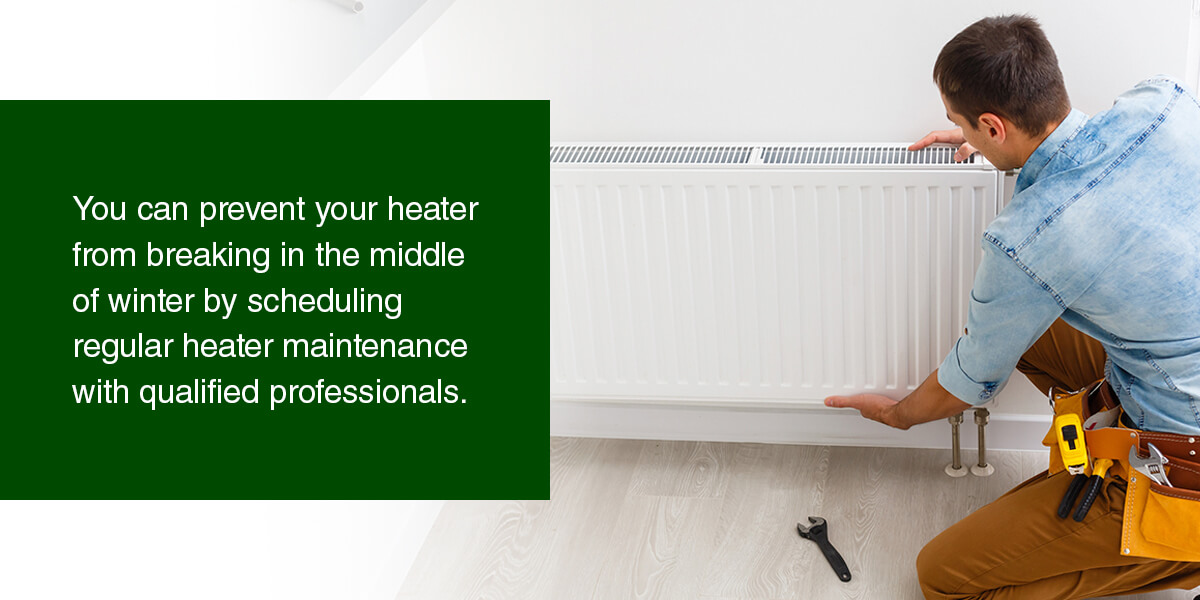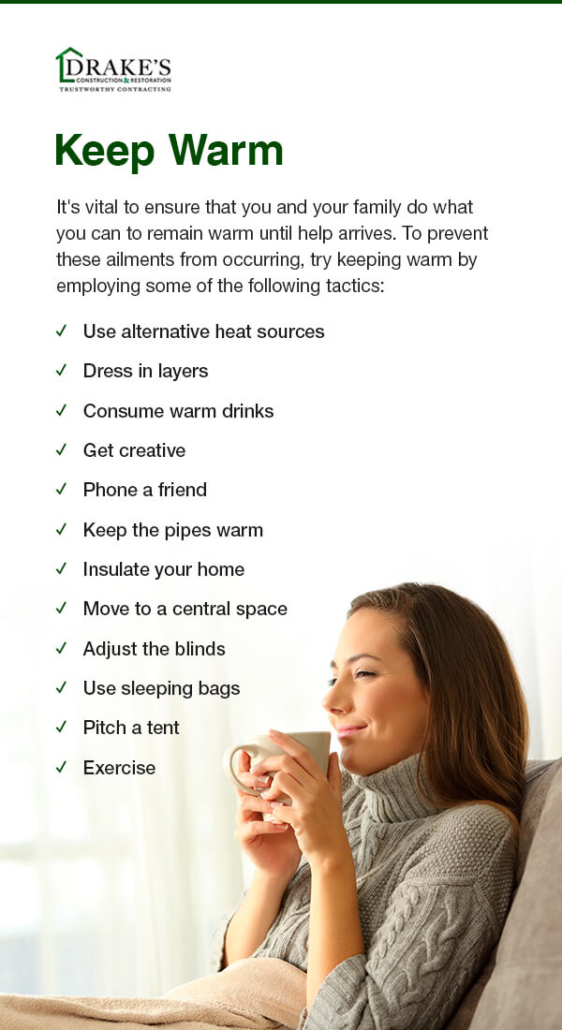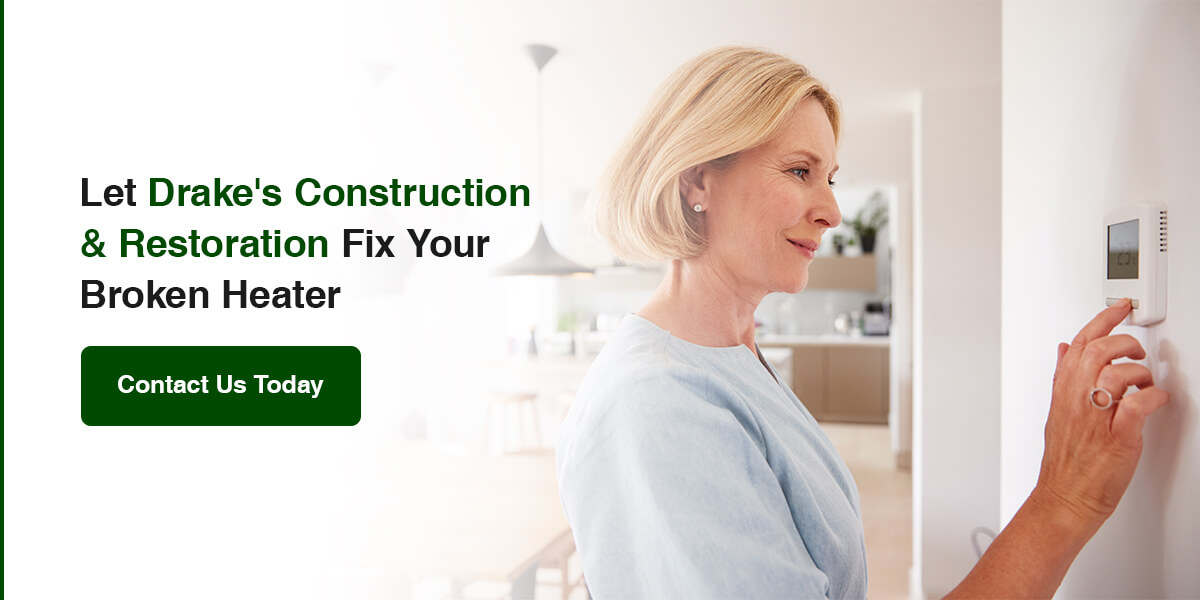What To Do If Your Heating System Breaks in Winter
If you live somewhere with harsh weather conditions, you know the importance of a functioning heater in the wintertime. Your heating system is responsible for delivering warm indoor temperatures during the coldest months, keeping you cozy and comfortable, no matter the weather. However, heaters do more than just maintain comfortable temperatures in the house. These units also safeguard residents from health risks associated with the cold winter weather.
Cold temperatures are as detrimental inside as it is outside. While 65-75 degrees Fahrenheit are considered safe indoor temperatures, anything below this range can be dangerous, especially for young children, older adults and those with existing health issues. Cold indoor temperatures account for many winter deaths and illnesses, including respiratory disease, asthma symptoms, increased blood pressure and cardiovascular disease. That’s why if you notice that your heater is broken in the winter, it’s vital to take the proper measures to repair it as quickly as possible.
You can learn how to fix a broken heater during the winter through this comprehensive guide.
What Do I Do if My Heater Breaks?
If your heater breaks in the middle of winter, there are steps you should take to get the issue under control. When you know what to do in the case of a broken heater, you can find a quick solution while ensuring that you and your family are safe.
1. Determine the Cause
If your heating system goes out, the first thing you should do is identify the cause of the issue. While heater failure can be alarming, it may not be as serious as you think and may even have a quick fix.
Try performing the following examinations to pinpoint the source of the breakdown:
- Make sure your heater is on: This tip may seem obvious, but you’d be surprised how often fixing a “broken” heater is only a matter of hitting the “on” switch.
- Confirm that the heater is set to heat: Though your heating system might be on, it may not be set to heat. It can be easy to mistake your heater as faulty when it’s actually generating cool air.
- Look for a blown fuse: Locate your fuse box to determine if your heater has a blown fuse. A fuse is likely blown if it looks cloudy, discolored or has damaged metal inside.
- Check for gas leaks: If your furnace produces a sulfur or rotten egg smell, you likely have a gas leak. This smell comes from a chemical called mercaptan that’s added to odorless natural gases to warn of a leak. Turn off your heater, shut off your gas lines, extinguish any open flames and leave the house immediately for your safety.
- Look for blockage: Check your heater’s filter for excess debris. A dirty filter blocks heat from traveling through your home’s vents or ducts.
- Check the circuit breaker: Your home’s main circuit breaker may have tripped as a result of a power outage or spike, causing your thermostat to shut off.
- Inspect the pilot light: When you turn on your heater, gas travels to the main burner and the pilot light ignites the gas to generate heat. If your pilot light goes out, your heating system will stop producing heat.
- Assess the blower motor: Your heater’s blower motor supplies the power needed to move the fan, sending warm air throughout your home. If the motor dies due to corrosion, condensation or a tripped circuit breaker, the fans will stop rotating and delivering heat.
- Examine the fan: The issue could also be with the fan itself. When a fan becomes damaged, loose or clogged with debris buildup, it will no longer push air through the vents or ducts.
- Look for a broken belt: Some heating, ventilation and air conditioning (HVAC) units have belt-driven motors that deliver rotational energy to power the fan. If this belt becomes slack due to age, damage or dirt buildup, it may rapidly degrade due to improper tension, eventually cracking or snapping. The smell of burning rubber often indicates a broken belt.
- Check for cracks in the heat exchanger: Your heat exchanger burns oils and gases to heat the air in your furnace. Over time, this device may develop stress cracks and wear as the metal components expand and contract, causing dangerous combustion gases like carbon monoxide or nitrogen dioxide to leak into your home. If you smell these gases, leave your house immediately.
2. Make Repairs or Call a Technician
Once you determine the cause of the broken heater, it’s time to make the proper repairs. If you’re confident that you can fix the issue yourself, such as flipping the breaker switch or changing an air filter, you can get to work to resolve it.
If you were unable to pinpoint the origin of the heater failure, don’t know how to repair it yourself or discover that it’s more complicated than you had expected, the best thing you can do is call an HVAC specialist to make a visit. These professionals have the tools, resources and expertise needed to deliver the safest and most efficient repairs to get your heating system back up and running in no time.
3. Keep Warm
Though many HVAC companies have fast, same-day emergency repair heating services, you may still experience a wait, as you can expect the technicians to arrive any time within a 24-hour span. During cold weather emergencies, HVAC services may be spread thin or you may suffer prolonged power outages, leading to longer wait times.
In the meantime, it’s vital to ensure that you and your family do what you can to remain warm until help arrives. That’s because prolonged exposure to the cold can result in many major health issues, such as chilblains, cold urticaria and hypothermia — conditions that can even occur indoors without adequate heating.
To prevent these ailments from occurring, try keeping warm by employing some of the following tactics:
- Use alternative heat sources: Even if your heating system isn’t working, you may have other sources of heat that will do the trick. For example, wood stoves, fireplaces and portable space heaters are excellent for producing heat.
- Dress in layers: You can insulate the body and better retain heat by wearing multiple layers of clothing. Try layering with short-sleeve shirts, long-sleeve shirts, sweaters, vests, sweatshirts, coats and blankets. You can also wear socks, slippers, hats and gloves for extra warmth.
- Consume warm drinks: There are many hot beverages you can drink to help warm your body, such as hot chocolate, tea, coffee and soup. Just holding a hot cup or bowl can warm your hands.
- Get creative: You may have to get creative to come up with effective heating methods. For example, using an electric blanket, hot water bottles or hand warmers are more unconventional ways of keeping warm. You can even create do-it-yourself (DIY) heating pads by microwaving socks filled with rice.
- Phone a friend: If you don’t have an electric heater in your home, try calling family, friends and neighbors to see if anyone is willing to lend one to you.
- Keep the pipes warm: Your pipes are most at risk of freezing in unheated interior spaces. Frozen pipes can cause pressure to build and eventually burst, causing considerable water damage. You can prevent your pipes from freezing by aiming a portable heater toward the main water pipe to keep it warm.
- Insulate your home: There are many makeshift ways you can create insulation in your home to trap in heat and block out cold air. Try using rolled-up towels as draft stoppers beneath doors, hang blankets over exterior doors or fill in door and window crevices with towels and tape.
- Move to a central space: If you live with family members or roommates, you should all move into one central room to conserve heat. It also helps to choose a room with carpeting.
- Adjust the blinds: You can use your blinds and curtains to your advantage by keeping them open during the day to draw in warmth from the sun and closing them at night to trap warm air in your home.
- Use sleeping bags: Sleeping bags are designed for outdoor use, which is why they deliver more insulation than standard blankets, surrounding the body to lock in heat. According to the National Park Service, one sleeping bag equates to two to three blankets.
- Pitch a tent: Tents are another piece of camping equipment meant for enhanced warmth. Using a tent in your home will help you trap body heat within a smaller space.
- Exercise: Engaging in physical activity is a tried and true way of increasing body temperature. Spend a few minutes exercising to raise your body’s core temperature and combat the cold.
When to Call the Experts to Fix Your Broken Heater
Though you may feel comfortable troubleshooting your heater yourself, there are some instances where calling a professional is the safer option. A malfunctioning heating system can pose significant risks if not properly repaired.
Between 2014 and 2018, there was an average of 48,530 fires involving heating equipment, resulting in 500 deaths and 1,350 injuries annually. Broken heaters can also cause fatal carbon monoxide poisoning, with 80% of these cases occurring during the winter months. That’s why the best course of action when your heating system breaks is to contact a professional HVAC company.
Be sure to look out for the many signs that your HVAC system may require professional repairs.
Strange Smells
Your heater shouldn’t have any sort of odor. That’s why any unusual smells are a major cause for concern. There are numerous reasons your heating system may be producing strange odors, each based on different smells:
- Dirty socks: This smell may indicate a mold infestation in the heating pump or bacterial growth in your heating system coils.
- Rotten eggs: A sulfur or rotten egg smell is a definite sign of a natural gas leak.
- Burning: Burning odors like burning plastic, melting rubber, hot metal or electrical smells may indicate that your motor or another electrical component is overheating, which can cause a fire.
- Smoke, diesel or oil: If your heater smells like smoke for over 24 hours after you first start it, there may be left-behind oil that’s creating a fog. The pilot light may have also ignited something nearby.
The origins and effects of these smells can be dangerous, which is why it’s essential to call heating professionals to deliver the proper repairs.
Noisy Operation
Though heaters aren’t completely silent, they shouldn’t make any loud or alarming noises when operating. If you hear anything more than the gentle sound of air escaping the vents, such as banging, clunking, whistling, scraping or rumbling, you should book professional repairs. These sounds may indicate anything from a cracked heat exchanger to a broken belt to ignition issues.
Luckily, HVAC technicians have the knowledge and skills to quickly identify the source of the sound and implement the right fix before things worsen.
Insufficient Heat
If your heating system is producing heat but isn’t doing so effectively, it’s time to book repairs. If you find yourself continuously turning up your thermostat without relief, that may be a sign that your heater isn’t generating enough heat — and what’s the point of a heating system if it’s not doing its job?
A system that isn’t heating properly could be a matter of a faulty thermostat, a leaky duct or anything in between. Calling the experts is a surefire way to diagnose and resolve the problem with ease, especially before you get a hefty utility bill.
Short Cycling
A furnace that turns on and off sporadically likely has a short cycling condition, where it shuts off before it has sufficiently heated your home to the set thermostat point. If your heating system begins to short cycle, there may be a problem with the wiring, ignition system or thermostat. Be sure to contact a professional to determine the exact cause of the issue and receive furnace repairs.
High Heating Bills
If your heating system seems to be working fine, but you notice that your monthly energy costs are suspiciously rising, there may be some underlying issues with your heater. The sooner your call an HVAC company, the faster you can get your system back in working order and minimize your heating bills.

How to Prevent Your Heater From Breaking
Your HVAC system works hard to maintain comfortable temperatures in your home year-round. This constant operation can take a toll on even the highest-quality heaters without the proper attention. You can prevent your heater from breaking in the middle of winter by scheduling regular heater maintenance with qualified HVAC professionals.
With scheduled preventive maintenance services, you can ensure that your system remains in peak condition, providing you with optimal heating during the wintertime. Routine upkeep also prepares your HVAC system for seasonal changes and enables you to catch any minor issues that may become larger problems in the future.
Other benefits of routine heater maintenance include:
- Conserving energy
- Preventing costly breakdowns
- Protecting your home
- Extending heating system life
- Improving comfort
- Enhancing air quality
- Minimizing repair costs
- Ensuring reliable performance
- Saving money
Let Drake’s Construction & Restoration Fix Your Broken Heater
You can receive professional heating system repairs to fix your broken heater at Drake’s Construction & Restoration. We pride ourselves on delivering high-quality work paired with exceptional customer service, treating all of our customers with the utmost respect and consideration. We offer local heating services in Parkersburg, West Virginia, including heating repair, emergency heating, preventive maintenance and new system installations, keeping customers warm even during the coldest months.
Contact us to learn more about our services or fill out a form to receive a project estimate today!
Click here to add your own text




